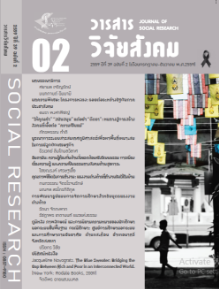“ให้คุณค่า” “สนับสนุน” แต่อย่า “ตีตรา”: หนทางสู่การสร้างสังคมที่เอื้อต่อ “ความเป็นแม่”
Main Article Content
บทคัดย่อ
การศึกษาครั้งนี้มีเป้าหมายเพื่อตอบคำถามที่ว่า จะทำอย่างไรเพื่อช่วยสนับสนุนให้แม่ทำงานยุคใหม่สามารถเลี้ยงลูกด้วยนมแม่ได้อย่างน้อย 6 เดือน ทั้งนี้โดยใช้ระเบียบวิธีการวิจัยเชิงคุณภาพในลักษณะวิธีการศึกษาแบบรายกรณีซึ่งเก็บข้อมูลจากผู้หญิงที่เป็นแม่ทำงานซึ่งสามารถเลี้ยงลูกด้วยน้ำนมแม่มาได้อย่างน้อย 6 เดือน โดยอาศัยวิธีการสุ่มตัวอย่างแบบเฉพาะเจาะจง ทั้งในเขตกรุงเทพมหานคร และจังหวัดเชียงใหม่ จำนวน 60 คน โดยใช้วิธีการสัมภาษณ์แบบเจาะลึกร่วมกับการสังเกตการณ์แบบไม่มีส่วนร่วม และใช้วิธีการวิเคราะห์เนื้อหาเพื่อสรุปประเด็นสำคัญ จะเห็นได้ว่า กระบวนการต่อรองและการปรับตัวของคนเป็นแม่เกิดขึ้นพร้อมๆ กันทั้งใน “พื้นที่ส่วนตัว” และใน “พื้นที่สาธารณะ” โดยการให้ผู้ช่วยเลี้ยงดูมีส่วนร่วมตั้งแต่การเตรียมความพร้อม การลดความยุ่งยากและอำนวยความสะดวกแก่คนเลี้ยงให้มากที่สุด การประนีประนอมและผสมผสานระหว่างข้อมูลหรือความเชื่อ เก่า-ใหม่ การปรับเปลี่ยนรูปแบบ การให้นมให้เหมาะสมกับบริบทของตน การเปิดใจรับสิ่งใหม่ การสร้างเครือข่ายประสบการณ์ร่วมกับผู้อื่น การพยายามปรับเปลี่ยน ลักษณะ รูปแบบ และเวลาในการทำงาน และพยายามลดแรงกดดันจากภายนอก อย่างไรก็ตามสังคมควร “ให้คุณค่า” กับการเลี้ยงลูกด้วยนมแม่ของผู้หญิง และมีหน้าที่ “สนับสนุน” ทรัพยากรพื้นฐานที่จำเป็นซึ่งจะเอื้อประโยชน์ต่อการเลี้ยงลูกด้วยนมแม่ของผู้หญิงทุกคนในสังคมอย่างเท่าเทียมโดยไม่เลือกปฏิบัติ แต่ไม่ควร “ตีตรา” แม่ที่ไม่ได้ให้นมลูก เพื่อให้ทุกคนได้เข้าถึงและรับผลประโยชน์จากนโยบายและแนวทางการปฏิบัติดังกล่าวอย่างทั่วถึงกัน
“Valuing”, “Supporting”, not “Labeling”: The Way to Mother-friendly Society
This research aims to answer the question, how to support modern working mothers for breastfeeding at least six months? This study uses qualitative research in the methods of case study, which collects data from 60 working mothers who went through the experience of breastfeeding for at least 6 months, by using purposive sampling technique, both in Bangkok and Chiang Mai. In-depth interview and non-participant observation were used in data collecting process and content analysis was done to analyze the key point from the empirical data. The result found that process of negotiating and adjusting of working mothers happen simultaneously, both in “private sphere” and “public sphere”. These mothers tried to negotiate the condition by having caretakers involve in preparation process, providing facilitations for caretakers as much as possible, compromising and blending of old-new beliefs, altering the suitable way of breastfeeding, be open minded and creating networks for sharing experience, changing job type, style of work, and working hours, and decreasing external pressure. However, breastfeeding should be “valued” and the society has responsibilities to equally “supports” necessary basic resources without discrimination, but should not “label” women who cannot breastfeed. Therefore, everyone can access to and benefits from the policy and its practice thoroughly.
Article Details
1) บทความนี้เป็นลิขสิทธิ์ของสถาบันวิจัยสังคม จุฬาลงกรณ์มหาวิทยาลัย แต่ความคิดเห็นและเนื้อหาเป็นของผู้แต่ง
2) ทัศนะและความคิดเห็นที่ปรากฏในบทความในวารสารวิจัยสังคมและปริทัศน์ สถาบันวิจัยสังคม จุฬาลงกรณ์มหาวิทยาลัย ถือเป็นความรับผิดชอบของผู้แต่งบทความนั้น และไม่ถือเป็นทัศนะและความรับผิดชอบของกองบรรณาธิการวารสารวิจัยสังคมและปริทัศน์ สถาบันวิจัยสังคม จุฬาลงกรณ์มหาวิทยาลัย กองบรรณาธิการไม่สงวนสิทธิ์ในการคัดลอก แต่ให้ระบุถึงการอ้างอิง


